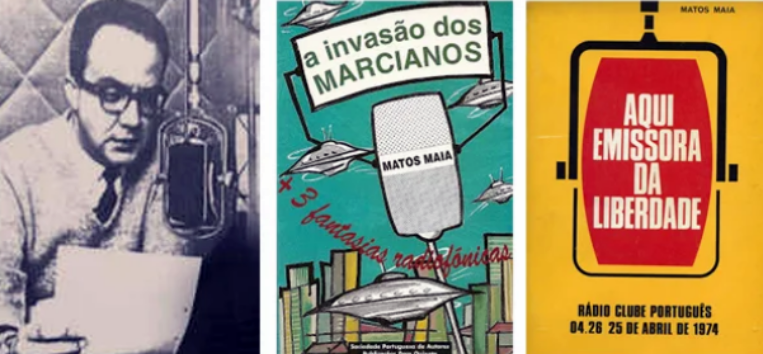José de MATOS Fernandes MAIA, Broadcaster and Journalist, born in Lisbon, was born on 24-03-1931 and died on 04-03-2005. As a student at the Escola Comercial Rodrigues Sampaio, in Lisbon, he was the author of several texts for police programs on the Liceu Pedro Nunes station, at the request of some of his student friends, this happened when he was 15 years old. He collaborated, then almost always as a producer and director, on all stations in Greater Lisbon: Rádio Peninsular, Voz de Lisboa, Rádio Graça, Clube Radiofônico de Portugal and Rádio Restauração.
At the Clube Radiofônico de Portugal he directed and presented some programs that, at the time, were quite successful, as were the cases of “Alfinetadas”, “Gazeta Policial”, and “Satisfaça o Seu Destino”. In 1956 Rádio Renascença invited him to collaborate with this station, where he remained until 1960, having produced, presented and collaborated with important programs: “Pátio das Canções”; “Programa Alvo”, “A 23ª Hora”, “Coisas que a Noite Trás” and many others. In 1959, the former Emissora Nacional invited him to host its Wednesday morning program for a period of six months. The contract lasted for six years.
In 1958, he made a broadcast on Radio Renascença that was considered the “great stoned in the pond”. “The Invasion of the Martians”, based on the novel by Herbert George Wells, “The War of the Worlds”. The broadcast was interrupted by the PSP, he was taken, under escort, to the Civil Government where he was imprisoned, in a cell, for about three hours. A week later he was questioned by Inspector Ferreira da Costa, from the former PIDE. In 1960 he was invited to join the staff of the former Radio Clube Português and, from then on, he became a full-time professional.
At Rádio Clube Português, he performed several functions, from director to General Coordinator, where he created programs that made history, namely: “When the Telephone Rings”, “Bossa Nova”, “Lisbon and the Tagus”, “No Mundo Happened”, “Bom Dia Manhã”, “Club à Gô-Gô”, “Meia-Noite”, “Sintonia 63”; “Disco”, “Hoje Convidamos” and, “Mystery and Fantasy”. He adapted and directed two serials, based on the novels “A Queda de Um Anjo”, by Camilo Castelo Branco and “When the Wolves Howl”, by Aquilino Ribeiro. In 1966 he took a General Directing Course at the BBC; in 1976 an identical course at the RDP and in 1982 a general monitor course, also at the RDP. In 1968 he was awarded, in Spain, by Cadena SER with the Ondas Prize, for his program “Lisbon and the Tagus”.
From 1976 to 1979 he directed two RDP channels. In 1980 he participated in the construction of Rádio Comercial, where he was head of the Production Departments, Regional Emitters, later becoming an advisor. In 1991 he won a prize from the Sociedade Portuguesa de Autores for his work in radio theatre, having adapted and directed, on Rádio Comercial, serials based on the novels “A Cidade e As Serras”, by Eça de Queirós; “A Escola do Paraíso”, by José Rodrigues Miguéis, “Seara de Vento”, by Manuel da Fonseca and, “Mau Tempo no Canal” by Vitorino Nemésio. He was Director of the Portuguese Society of Authors, member of the Radio Commission and promoter and coordinator of a series of Radio Colloquiums, held between 1993 and 1994. Matos Maia is also the author of lyrics for songs and fados, some recorded by well-known artists , such as: Lídia Ribeiro, Tristão da Silva, Lucília do Carmo, Agostinho dos Santos and others.
He published three books: “Aqui, Emissora da Liberdade”, a detailed account of the occupation of the former Radio Clube Português, “Telephony, History of Radio in Portugal”, “The Invasion of the Martians” and, “Uma Página, Págia e Meia”. In 1998, 1999 and 2000 she wrote, directed and staged 3 popular revues for the Quarteira Amador Theater Group
Main works: Here Emissora da Liberdade, (1975); Telephony, (1995); The Invasion of the Martians + 3 Radiophonic Fantasies, (1996).
Source: ruascomhistória.wordpress.com






i remember him…rip
This is good article